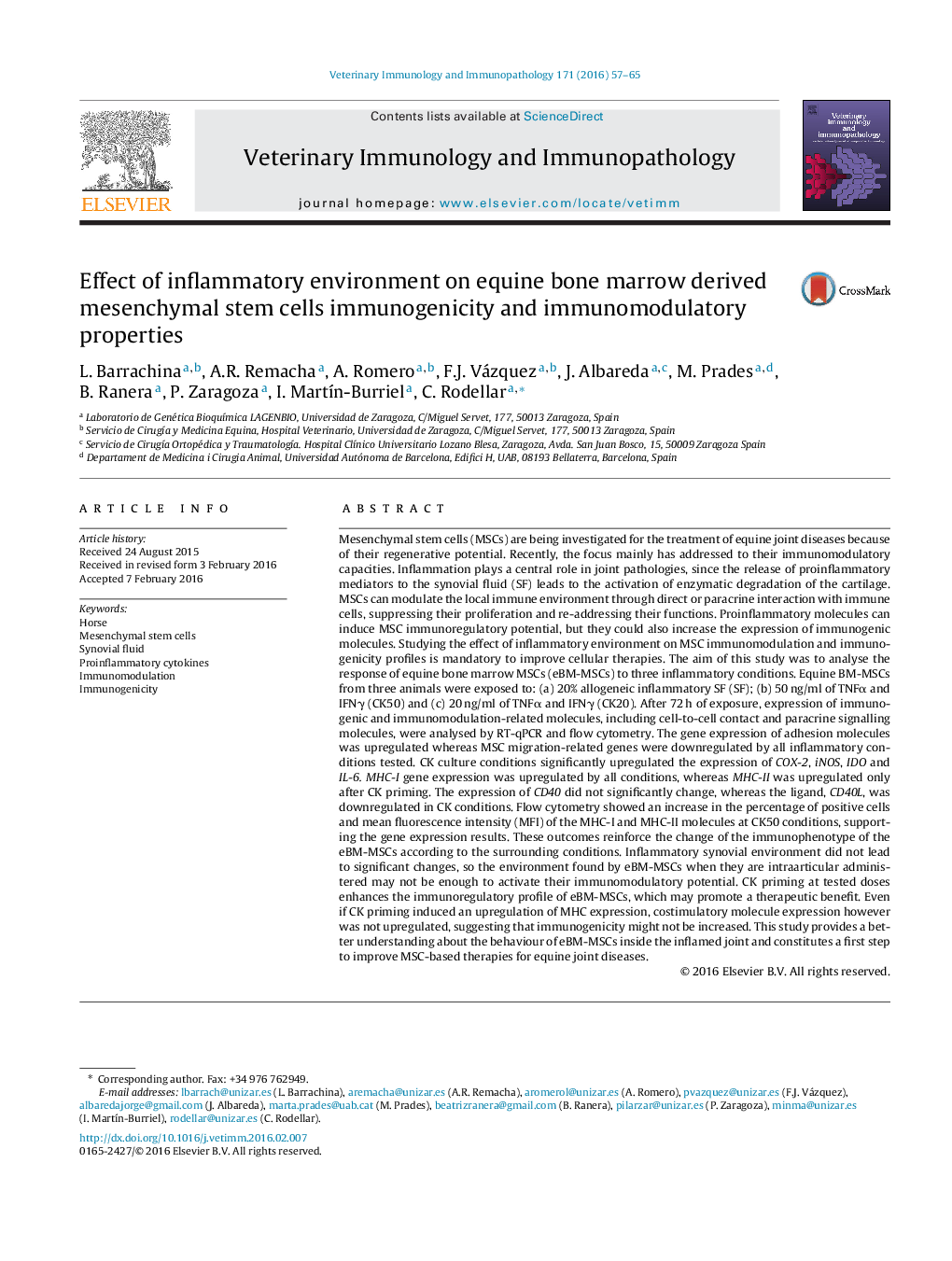| کد مقاله | کد نشریه | سال انتشار | مقاله انگلیسی | نسخه تمام متن |
|---|---|---|---|---|
| 5796609 | 1555013 | 2016 | 9 صفحه PDF | دانلود رایگان |
- Joint inflammation did not activate the eBM-MSCs immunomodulatory potential.
- Cytokine priming upregulates the immunoregulatory profile of eBM-MSCs.
- Cytokines lead to an increase in MHC, but not in costimulatory molecules expression.
- Equine BM-MSCs change their immune-phenotype according to their environment.
Mesenchymal stem cells (MSCs) are being investigated for the treatment of equine joint diseases because of their regenerative potential. Recently, the focus mainly has addressed to their immunomodulatory capacities. Inflammation plays a central role in joint pathologies, since the release of proinflammatory mediators to the synovial fluid (SF) leads to the activation of enzymatic degradation of the cartilage. MSCs can modulate the local immune environment through direct or paracrine interaction with immune cells, suppressing their proliferation and re-addressing their functions. Proinflammatory molecules can induce MSC immunoregulatory potential, but they could also increase the expression of immunogenic molecules. Studying the effect of inflammatory environment on MSC immunomodulation and immunogenicity profiles is mandatory to improve cellular therapies. The aim of this study was to analyse the response of equine bone marrow MSCs (eBM-MSCs) to three inflammatory conditions. Equine BM-MSCs from three animals were exposed to: (a) 20% allogeneic inflammatory SF (SF); (b) 50 ng/ml of TNFα and IFNγ (CK50) and (c) 20 ng/ml of TNFα and IFNγ (CK20). After 72 h of exposure, expression of immunogenic and immunomodulation-related molecules, including cell-to-cell contact and paracrine signalling molecules, were analysed by RT-qPCR and flow cytometry. The gene expression of adhesion molecules was upregulated whereas MSC migration-related genes were downregulated by all inflammatory conditions tested. CK culture conditions significantly upregulated the expression of COX-2, iNOS, IDO and IL-6. MHC-I gene expression was upregulated by all conditions, whereas MHC-II was upregulated only after CK priming. The expression of CD40 did not significantly change, whereas the ligand, CD40L, was downregulated in CK conditions. Flow cytometry showed an increase in the percentage of positive cells and mean fluorescence intensity (MFI) of the MHC-I and MHC-II molecules at CK50 conditions, supporting the gene expression results. These outcomes reinforce the change of the immunophenotype of the eBM-MSCs according to the surrounding conditions. Inflammatory synovial environment did not lead to significant changes, so the environment found by eBM-MSCs when they are intraarticular administered may not be enough to activate their immunomodulatory potential. CK priming at tested doses enhances the immunoregulatory profile of eBM-MSCs, which may promote a therapeutic benefit. Even if CK priming induced an upregulation of MHC expression, costimulatory molecule expression however was not upregulated, suggesting that immunogenicity might not be increased. This study provides a better understanding about the behaviour of eBM-MSCs inside the inflamed joint and constitutes a first step to improve MSC-based therapies for equine joint diseases.
Journal: Veterinary Immunology and Immunopathology - Volume 171, March 2016, Pages 57-65
